
"Amazing Grace" is a Christian hymn published in 1779, written in 1772 by English Anglican clergyman and poet John Newton (1725–1807). It is an immensely popular hymn, particularly in the United States, where it is used for both religious and secular purposes.

Original sin in Christian theology refers to the condition of sinfulness that all humans share, which is inherited from Adam and Eve due to the Fall, involving the loss of original righteousness and the distortion of the Image of God. The biblical basis for the belief is generally found in Genesis 3, and in texts such as Psalm 51:5 and Romans 5:12–21.
Justificatio sola fide, meaning justification by faith alone, is a soteriological doctrine in Christian theology commonly held to distinguish the Lutheran and Reformed traditions of Protestantism, among others, from the Catholic, Eastern Orthodox, Oriental Orthodox, Assyrian and Anabaptist churches. The doctrine asserts that it is on the basis of faith alone that believers are made right of sin ; and not on the basis of what Paul the Apostle calls "works of the law", which sola fide proponents interpret as including not only moral, legal or ceremonial requirements but any good works or "works of charity."
A doxology is a short hymn of praises to God in various forms of Christian worship, often added to the end of canticles, psalms, and hymns. The tradition derives from a similar practice in the Jewish synagogue, where some version of the Kaddish serves to terminate each section of the service.
The Holiness movement is a Christian movement that emerged chiefly within 19th-century Methodism, and to a lesser extent influenced other traditions such as Quakerism, Anabaptism, and Restorationism. Churches aligned with the holiness movement teach that the life of a born again Christian should be free of sin. The movement is historically distinguished by its emphasis on the doctrine of a second work of grace, which is called entire sanctification or Christian perfection. The word Holiness refers specifically to this belief in entire sanctification as an instantaneous, definite second work of grace, in which original sin is cleansed, the heart is made perfect in love, and the believer is empowered to serve God. For the Holiness movement, "the term 'perfection' signifies completeness of Christian character; its freedom from all sin, and possession of all the graces of the Spirit, complete in kind." A number of Christian denominations, parachurch organizations, and movements emphasize those Holiness beliefs as central doctrine.

The "Battle Hymn of the Republic", also known as the "Mine Eyes Have Seen the Glory" or the "Glory, Glory Hallelujah" outside of the United States, is an American patriotic song that was written by the abolitionist writer Julia Ward Howe during the American Civil War.
The Wesleyan Church, also known as the Wesleyan Methodist Church and Wesleyan Holiness Church depending on the region, is a Methodist Christian denomination in the United States, Canada, the United Kingdom, South Africa, Namibia, Sierra Leone, Liberia, Indonesia, and Australia. The church is aligned with the Wesleyan-Holiness movement and has roots in the teachings of John Wesley. It adheres to Wesleyan-Arminian doctrine and is a member of the World Methodist Council.

"O for a Thousand Tongues to Sing" is a Christian hymn written by Charles Wesley. The hymn was placed first in John Wesley's A Collection of Hymns for the People Called Methodists published in 1780. It was the first hymn in every (Wesleyan) Methodist hymnal from that time until the publication of Hymns and Psalms in 1983.

Within many denominations of Christianity, Christian perfection is the theological concept of the process or the event of achieving spiritual maturity or perfection. The ultimate goal of this process is union with God characterized by pure love of God and other people as well as personal holiness or sanctification. Other terms used for this or similar concepts include entire sanctification, holiness, perfect love, the baptism with the Holy Spirit, the indwelling of the Holy Spirit, baptism by fire, the second blessing, and the second work of grace.

Backsliding, also known as falling away or described as "committing apostasy", is a term used within Christianity to describe a process by which an individual who has converted to Christianity reverts to pre-conversion habits and/or lapses or falls into sin, when a person turns from God to pursue their own desire. To revert to sin or wrongdoing, especially in religious practice, someone lapses into previous undesirable patterns of behavior. To be faithful, thus to believe backsliding is a reversion, in principle upholds the Apostle Paul’s condition in salvation: "If you declare with your mouth, 'Jesus is Lord,' and believe in your heart that God raised him from the dead, you will be saved."

"I Surrender All" is a Christian hymn, with words written by American art teacher and musician Judson W. Van DeVenter (1855–1939), who subsequently became a music minister and evangelist. It was put to music by Winfield S. Weeden (1847–1908), and published in 1896.

Wesleyan theology, otherwise known as Wesleyan–Arminian theology, or Methodist theology, is a theological tradition in Protestant Christianity based upon the ministry of the 18th-century evangelical reformer brothers John Wesley and Charles Wesley. More broadly it refers to the theological system inferred from the various sermons, theological treatises, letters, journals, diaries, hymns, and other spiritual writings of the Wesleys and their contemporary coadjutors such as John William Fletcher, Methodism's systematic theologian.

"'Tis So Sweet to Trust in Jesus" is a Christian hymn with music by William J. Kirkpatrick and lyrics by Louisa M. R. Stead. The lyrics were written in 1882. They appeared in Stead's Songs of Triumph.

Edwin Othello Excell, commonly known as E. O. Excell, was a prominent American publisher, composer, song leader, and singer of music for church, Sunday school, and evangelistic meetings during the late nineteenth and early twentieth centuries. Some of the significant collaborators in his vocal and publishing work included Sam P. Jones, William E. Biederwolf, Gipsy Smith, Charles Reign Scoville, J. Wilbur Chapman, W. E. M. Hackleman, Charles H. Gabriel and D. B. Towner.

In Christianity, sin is an immoral act and transgression of divine law. The doctrine of sin is central to the Christian faith, since its basic message is about redemption in Christ.

I Love to Tell the Story, A Hymns Collection is a studio album released by Christian singer Mark Lowry. The album was released by EMI Christian Music Group on July 17, 2007. The album features renditions of several traditional and popular Christian hymns.
"Oh, Freedom" is a post-Civil War African-American freedom song. It is often associated with the Civil Rights Movement, with Odetta, who recorded it as part of the "Spiritual Trilogy", on her Odetta Sings Ballads and Blues album, and with Joan Baez, who performed the song at the 1963 March on Washington. Baez has since performed the song live numerous times, both during her concerts and at other events. The song was first recorded in 1931 by the E. R. Nance Family as "Sweet Freedom". Writer and radio producer Richard Durham used it as an opening in his 1948–1950 radio anthology Destination Freedom.
"Jaya Ho" is a Christian hymn written in the Hindi language by an unknown author. The song's Hindi title, more frequently transliterated "Jai ho" in other contexts, means "may there be victory" and is frequently used interjectively to praise God. The hymn's English title is often given as "Victory Hymn" or "Victory Be to You [i.e., God]".

Julia Harriette Johnston (1849–1919) was a Presbyterian teacher, author, and musician who wrote the lyrics to the song, "Grace Greater Than All Our Sin".

Jesus Paid It All is a traditional American hymn about the penal substitutionary atonement for sin by the death of Jesus. The song references many Bible verses, including Romans 5 and Isaiah 1:18.














